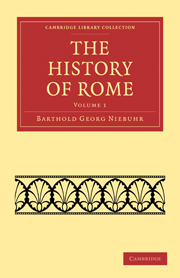Book contents
- Frontmatter
- TO HIS MAJESTY FREDERIC WILLIAM THE THIRD, KING OF PRUSSIA
- PREFACE
- Contents
- INTRODUCTION
- ANCIENT ITALY
- The Oenotrians and Pelasgians
- The Opicans and Ausonians
- The Aborigines and Latins
- The Sabines and Sabellians
- The Tuscans or Etruscans
- The Umbrians
- Iapygia
- The Greeks in Italy
- The Ligurians and Venetians
- The Three Islands
- Conclusion
- THE PRELIMINARY HISTORY OF ROME
- ROME
Conclusion
Published online by Cambridge University Press: 05 June 2011
- Frontmatter
- TO HIS MAJESTY FREDERIC WILLIAM THE THIRD, KING OF PRUSSIA
- PREFACE
- Contents
- INTRODUCTION
- ANCIENT ITALY
- The Oenotrians and Pelasgians
- The Opicans and Ausonians
- The Aborigines and Latins
- The Sabines and Sabellians
- The Tuscans or Etruscans
- The Umbrians
- Iapygia
- The Greeks in Italy
- The Ligurians and Venetians
- The Three Islands
- Conclusion
- THE PRELIMINARY HISTORY OF ROME
- ROME
Summary
No one can ascend up to their springs along the streams by which the tribes of the present human race have been carried down: still less can any eye pierce across the chasm, which there severs the order of things wherein we and our history are comprised, from an earlier one. That a former race of mankind has passed away, is a general popular belief; and it was shared and cherished by the Greek philosophers: but they dissent from the people in this: Plato and Aristotle suppose that a few, embers as it were, had escaped from the general ruin, and that from them a new race of mankind had gradually spread over the desolated earth; while the people in the renewed life of man saw a new creation, the Lai of Deucalion, the Myrmidons of Æacus; and deemed the extinct race rebels against the heavenly powers, led astray by the consciousness of their enormous strength. So the later Jews dreamt of giants before the deluge; so the Greeks of the Titans of Phlegra, and of those who perished in the flood of Deucalion or of Ogyges: so the savages of North America fable of the Mammoth, that the devastated world had invoked the lightnings of heaven, and not in vain, against the reason-gifted monster, the man of the primitive age.
- Type
- Chapter
- Information
- The History of Rome , pp. 145 - 149Publisher: Cambridge University PressPrint publication year: 2010First published in: 1828



